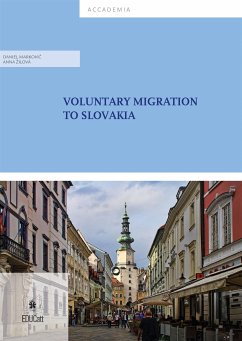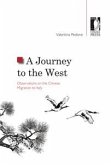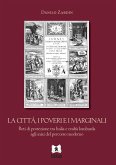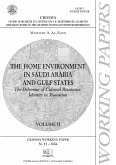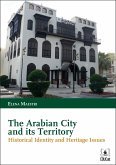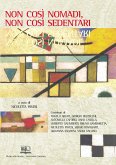The theme of this research monograph is a voluntary migration to Slovakia. Human migration is the movement of people from one place to another with the intention of settling permanently or temporarily in a new location. Migrating are individuals, families, groups and the entire communities.
Between 2015 and 2019, the attention of the European mass media has focused on issues of forced migration from Africa and Asia to Europe. Emphasis was placed on the serious situation of refugees in their home countries and during their journey to Europe. In 2018, Slovakia was shocked by the murder of Henry Acorda, an immigrant from the Philippines, caused by Slovak man. The theme of migration, therefore, resonates in professional forums and among the population. It was a campaign content for the 2019 presidential and European elections in Slovakia.
Emigration from Slovakia to the Czech Republic, the countries of Western Europe and North America and its reasons are scientifically examined relatively well. Certain white spots in research are perceived in the study of immigration to Slovakia. Statistics about asylum applicants and granted asylums and supplementary protections show us that Slovakia is rarely the target country of forced migrants. However, the statistics of the Police Presidium after the accession of Slovakia to the European Union (EU) point to a significant increase in the number of voluntary immigrants (incomers)-foreigners, citizens of the Union and third-country nationals in Slovakia. In our research, we are interested in the experiences, opinions and motives of people who come to Slovakia voluntarily-voluntary migrants.
Therefore, this is a descriptive research problem. We do not have a study in Slovakia that would systematically explore this phenomenon in recent years. The aim of the publication is to characterize the current state of the examined issue – voluntary migration to Slovakia. The aim of our research is to understand the views and experiences of migrants-voluntary migrants in regards with their lives in Slovakia (in the field of human relations, in employment or during studies and in the economic sphere) and to identify the reasons for immigration to Slovakia. That means our monograph fo6 cuses on the specific area of migration. Within the framework of immigration to Slovakia, we focus on voluntary migration; research has expanded our knowledge of social reality.
Migration is a phenomenon that has been accompanying humanity since the beginning of history, but with rapid technological advances in transport at the beginning of the twentieth century and telecommunication at the end of the twentieth century over the present decades, people around the world are interconnected. A huge number of migrants travel across continents every day, and huge amounts of information and ideas are exchanged in culture every second. Cosmopolitan thinkers dreamed of the integration of the global community politically, economically and culturally; these tendencies are currently very clear (Dai, Lu, 2017). Although Slovakia is not an attractive destination for migrants, the situation is gradually changing.
Excerpt from the Preface
Between 2015 and 2019, the attention of the European mass media has focused on issues of forced migration from Africa and Asia to Europe. Emphasis was placed on the serious situation of refugees in their home countries and during their journey to Europe. In 2018, Slovakia was shocked by the murder of Henry Acorda, an immigrant from the Philippines, caused by Slovak man. The theme of migration, therefore, resonates in professional forums and among the population. It was a campaign content for the 2019 presidential and European elections in Slovakia.
Emigration from Slovakia to the Czech Republic, the countries of Western Europe and North America and its reasons are scientifically examined relatively well. Certain white spots in research are perceived in the study of immigration to Slovakia. Statistics about asylum applicants and granted asylums and supplementary protections show us that Slovakia is rarely the target country of forced migrants. However, the statistics of the Police Presidium after the accession of Slovakia to the European Union (EU) point to a significant increase in the number of voluntary immigrants (incomers)-foreigners, citizens of the Union and third-country nationals in Slovakia. In our research, we are interested in the experiences, opinions and motives of people who come to Slovakia voluntarily-voluntary migrants.
Therefore, this is a descriptive research problem. We do not have a study in Slovakia that would systematically explore this phenomenon in recent years. The aim of the publication is to characterize the current state of the examined issue – voluntary migration to Slovakia. The aim of our research is to understand the views and experiences of migrants-voluntary migrants in regards with their lives in Slovakia (in the field of human relations, in employment or during studies and in the economic sphere) and to identify the reasons for immigration to Slovakia. That means our monograph fo6 cuses on the specific area of migration. Within the framework of immigration to Slovakia, we focus on voluntary migration; research has expanded our knowledge of social reality.
Migration is a phenomenon that has been accompanying humanity since the beginning of history, but with rapid technological advances in transport at the beginning of the twentieth century and telecommunication at the end of the twentieth century over the present decades, people around the world are interconnected. A huge number of migrants travel across continents every day, and huge amounts of information and ideas are exchanged in culture every second. Cosmopolitan thinkers dreamed of the integration of the global community politically, economically and culturally; these tendencies are currently very clear (Dai, Lu, 2017). Although Slovakia is not an attractive destination for migrants, the situation is gradually changing.
Excerpt from the Preface

